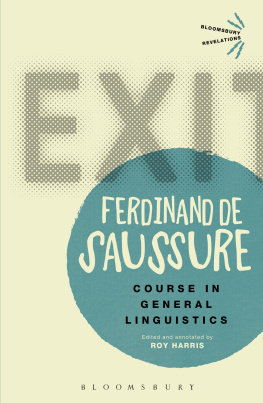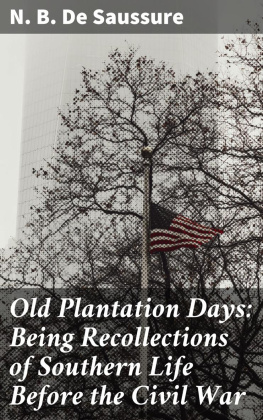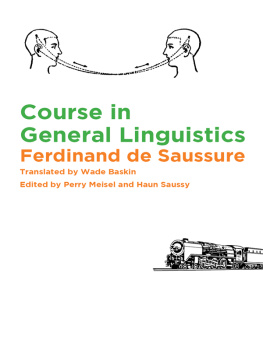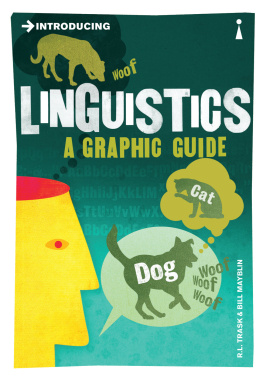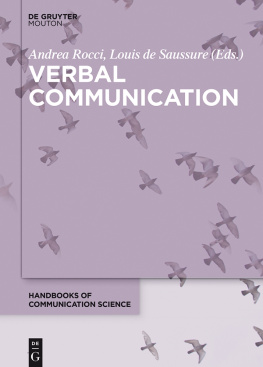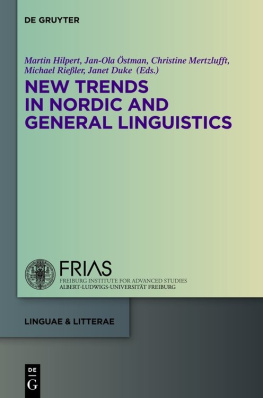Ferdinand de Saussure - Course in General Linguistics
Here you can read online Ferdinand de Saussure - Course in General Linguistics full text of the book (entire story) in english for free. Download pdf and epub, get meaning, cover and reviews about this ebook. publisher: Bloomsbury Academic, genre: Science. Description of the work, (preface) as well as reviews are available. Best literature library LitArk.com created for fans of good reading and offers a wide selection of genres:
Romance novel
Science fiction
Adventure
Detective
Science
History
Home and family
Prose
Art
Politics
Computer
Non-fiction
Religion
Business
Children
Humor
Choose a favorite category and find really read worthwhile books. Enjoy immersion in the world of imagination, feel the emotions of the characters or learn something new for yourself, make an fascinating discovery.
- Book:Course in General Linguistics
- Author:
- Publisher:Bloomsbury Academic
- Genre:
- Rating:5 / 5
- Favourites:Add to favourites
- Your mark:
- 100
- 1
- 2
- 3
- 4
- 5
Course in General Linguistics: summary, description and annotation
We offer to read an annotation, description, summary or preface (depends on what the author of the book "Course in General Linguistics" wrote himself). If you haven't found the necessary information about the book — write in the comments, we will try to find it.
Course in General Linguistics — read online for free the complete book (whole text) full work
Below is the text of the book, divided by pages. System saving the place of the last page read, allows you to conveniently read the book "Course in General Linguistics" online for free, without having to search again every time where you left off. Put a bookmark, and you can go to the page where you finished reading at any time.
Font size:
Interval:
Bookmark:
Course in General Linguistics
TITLES IN THE BLOOMSBURY REVELATIONS SERIES
Aesthetic Theory , Theodor W. Adorno
Being and Event, Alain Badiou
On Religion, Karl Barth
The Language of Fashion , Roland Barthes
The Intelligence of Evil , Jean Baudrillard
I and Thou , Martin Buber
Never Give In!, Winston Churchill
The Boer War, Winston Churchill
The Second World War, Winston Churchill
In Defence of Politics , Bernard Crick
Intensive Science and Virtual Philosophy , Manuel DeLanda
A Thousand Plateaus , Gilles Deleuze and Flix Guattari
Anti-Oedipus , Gilles Deleuze and Flix Guattari
Cinema I , Gilles Deleuze
Cinema II , Gilles Deleuze
Taking Rights Seriously , Ronald Dworkin
Discourse on Free Will , Desiderius Erasmus and Martin Luther
Education for Critical Consciousness , Paulo Freire
Marxs Concept of Man, Erich Fromm and Karl Marx
To Have or To Be? , Erich Fromm
Truth and Method , Hans Georg Gadamer
All Men Are Brothers , Mohandas K. Gandhi
Violence and the Sacred , Rene Girard
The Essence of Truth , Martin Heidegger
The Eclipse of Reason , Max Horkheimer
The Language of the Third Reich , Victor Klemperer
Rhythmanalysis , Henri Lefebvre
After Virtue , Alasdair MacIntyre
Time for Revolution, Antonio Negri
Politics of Aesthetics , Jacques Ranciere
Course in General Linguistics , Ferdinand de Saussure
An Actor Prepares , Constantin Stanislavski
Building A Character , Constantin Stanislavski
Creating A Role , Constantin Stanislavski
Interrogating the Real , Slavoj iek
Some titles are not available in North America.
Course in General Linguistics
Ferdinand de Saussure
Translated and annotated by Roy Harris
With a new introduction by Roy Harris

Bloomsbury Academic
An imprint of Bloomsbury Publishing Plc
| 50 Bedford Square | 1385 Broadway |
| London | New York |
| WC1B 3DP | NY 10018 |
| UK | USA |
www.bloomsbury.com
Bloomsbury is a registered trade mark of Bloomsbury Publishing Plc
This translation first published in 1983 by Gerald Duckworth & Co. Ltd.
English Translation and Editorial Matter 1983, 2013 Roy Harris
Bloomsbury Revelations edition first published in 2013 by Bloomsbury Academic
All rights reserved. No part of this publication may be reproduced or transmitted in any form or by any means, electronic or mechanical, including photocopying, recording, or any information storage or retrieval system, without prior permission in writing from the publishers.
No responsibility for loss caused to any individual or organization acting on or refraining from action as a result of the material in this publication can be accepted by Bloomsbury Academic or the author.
British Library Cataloguing-in-Publication Data
A catalogue record for this book is available from the British Library.
ePub ISBN: 978-1-4725-0538-5
Typeset by Deanta Global Publishing Services, Chennai, India
Contents
Roy Harris
Saussures Cours de linguistique gnrale occupies a place of unique importance in the history of Western thinking about man in society. It is a key text not only within the development of linguistics but also in the formation of that broader intellectual movement of the twentieth century known as structuralism. With the sole exception of Wittgenstein, no thinker has had as profound an influence on the modern view of homo loquens as Saussure.
The revolution Saussure ushered in has rightly been described as Copernican. For instead of mens words being seen as peripheral to mens understanding of reality, mens understanding of reality came to be seen as revolving about their social use of verbal signs. In the Cours de linguistique gnrale we see this new approach clearly articulated for the first time. Words are not vocal labels which have come to be attached to things and qualities already given in advance by Nature, or to ideas already grasped independently by the human mind. On the contrary languages themselves, collective products of social interaction, supply the essential conceptual frameworks for mens analysis of reality and, simultaneously, the verbal equipment for their description of it. The concepts we use are creations of the language we speak.
Saussures standing as the founder of modern linguistics remains unchallenged more than half a century after his death. It is based on two facts. One fact is that Saussure, although only one among many distinguished linguists of his day, was the first to recognise the particular range of theoretical questions which had to be answered if linguistics was ever to take its place among the sciences. The other fact is that Saussure himself proposed answers to those questions which have remained either the basis or the point of departure for all subsequent linguistic theory within the academic discipline which thereafter claimed the designation linguistics.
This dual achievement suffices to explain Saussures pivotal place in the evolution of language studies. But he plays a no less crucial role when his work is seen in a wider cultural context. For the founder of modern linguistics at the same time founded semiology, the general science of signs, within which linguistics was to be one special branch. In so doing, Saussure opened up a new approach to the study of many other human patterns of behaviour. It was an approach later to be exploited by theorists in such diverse fields as art, architecture, philosophy, literary criticism and social anthropology. The implications of Saussures technique for dealing with linguistic analysis extend far beyond the boundaries of language, in ways which make the Cours de linguistique gnrale without doubt one of the most far-reaching works concerning the study of human cultural activities to have been published at any time since the Renaissance.
* * *
Saussures proposals for the establishment of linguistics as an independent science may at the risk of making them sound rather unexciting be summarised as follows. He rejected the possibility of an all-embracing science of language, which would deal simultaneously with physiological, sociological, philosophical and psychological aspects of the subject. Instead, he proposed to cut through the perplexing maze of existing approaches to the study of linguistic phenomena by setting up a unified discipline, based upon a single, clearly defined concept: that of the linguistic sign. The essential feature of Saussures linguistic sign is that, being intrinsically arbitrary, it can be identified only by contrast with coexisting signs of the same nature, which together constitute a structured system. By taking this position, Saussure placed modern linguistics in the vanguard of twentieth-century structuralism.
It was a position which committed Saussure to drawing a radical distinction between diachronic (or evolutionary) linguistics and synchronic (or static) linguistics, and giving priority to the latter. For words, sounds and constructions connected solely by processes of historical development over the centuries cannot possibly, according to Saussures analysis, enter into structural relations with one another, any more than Napoleons France and Caesars Rome can be structurally united under one and the same political system.
Truism though this may now seem, there is no doubt that in arguing along these lines Saussure was swimming against the prevailing tide in language studies throughout his lifetime. For the great philological achievements of the nineteenth century had all been founded upon a historical and comparativist approach to language. Late-nineteenth-century philology was as uncompromisingly evolutionary in outlook as Darwinian biology. Saussure was the first to question whether the historical study of languages could possibly provide a satisfactory foundation for a science of linguistics. The question was as profound as it was startling: for the assumption most of Saussures contemporaries made was that historical philology already had provided the only possible scientific foundation. They believed, as Max Mller optimistically put it in the 1860s, that linguists were already dealing with the facts of language just as scientifically as the astronomer treats the stars of heaven, or the botanist the flowers of the field. In Saussures view, nothing could have been more profoundly mistaken.
Next pageFont size:
Interval:
Bookmark:
Similar books «Course in General Linguistics»
Look at similar books to Course in General Linguistics. We have selected literature similar in name and meaning in the hope of providing readers with more options to find new, interesting, not yet read works.
Discussion, reviews of the book Course in General Linguistics and just readers' own opinions. Leave your comments, write what you think about the work, its meaning or the main characters. Specify what exactly you liked and what you didn't like, and why you think so.

